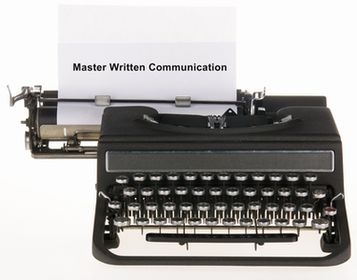
In today’s workplace, effective communication makes all the difference in the world. Big and small companies are dedicating entire departments to making sure the inflow and outflow of communication is both accurate and representative of their company. Without being able to effectively communicate your business offerings, even though you might have the best product in the world, your business won’t survive. In order to help you master the art of written communication at work, we’ve come up with a few steps to follow.
Work on being clear and concise when it comes to any form of written communication. You need to be able to impart information and instructions so that your employees will understand. If this isn’t done properly, your entire communications strategy might be misinterpreted, which can lead to things like brand confusion, marketing fiascos, and public relations nightmares. You may understand how to do a task perfectly, but if you’re not able to list out the steps in a clear and concise way, your meaning might get lost in translation.
Read everything to yourself–even out loud–before sending, posting, or even letting your co-workers read it. This is one of the easiest ways to improve your written skills, because it’ll help you catch mistakes. The goal of reading everything you write will help you catch small grammatical or spelling errors, as well as ensuring that you are writing a clear message. Reading everything over a few times will also allow you to catch things you might’ve missed, or things you may simply decide don’t make sense.
It might not seem to be the most common thing, but a lot of people do better with hands-on learning, and taking notes from your boss or senior-level co-workers might do the trick for you. Review letters, memos, and emails prepared by others in the company. Look for patterns in business communication, like short, to-the-point paragraphs and requests for further action. Pay special attention to the letters and other documents created by your boss and other members of the management team.
Confidentiality is important for a lot of reasons. The data pertaining to recruitment, compensation, and management of employees is naturally sensitive. If information is misconstrued, interpreted incorrectly, or written incorrectly, big problems could eventually arise. The smallest of errors, like switching “and” for “or,” could mean all the difference in the world. When you’re writing pertinent, sensitive, or confidential information, it’s important to read everything, have it looked at by other teammates, and just double-check everything. You can’t be too safe.
The list of words to avoid when mitigating conflict in the workplace is nearly infinite. As Generation Y starts entering the workforce, employers must be on the lookout for terms associated with their generation that could potentially worsen a conflict situation. One of the most commonly used words of this generation is “whatever.” It’s used quite frequently, and it’s pretty irritating. When someone is using this phrase they are saying, “I’m not interested in what you have to say.” That’s a hot button in the workplace and can take conflict to an entirely new level.
Another big word to watch out for is “you.” It doesn’t sound bad, but when you’re using the word during a heated interaction, it tends to point blame on the individual instead of working out the present conflict. When writing reviews or individual developmental plans, you’ll want to avoid words like this because they may come across in an entirely new way that will not help the situation.
There has been a lot of discussion surrounding how to address a boss vs. a coworker in an email. In a formal business environment, an email to your boss (vertical communication) should be simple and direct, following this format: give a formal greeting, address your concern, and close. If someone is in a position of power, their inbox is usually flooded with tons of emails, so keeping it simple and direct is the way to go. As far as addressing a co-worker who is on the same level as you (horizontal), you’ll want to keep it professional, but you can be more lax in how you actually address them and the message being delivered.
While mastering written communication is essential in the workplace, it is not the only thing to focus on. Good communication in the workplace requires strengths in all areas, including verbal, non-verbal, and written. With time and practice, these skills will develop over time and will boost your career in the best ways. Make sure that you aren’t focusing 100% on one type of communication style, because to be successful, you’ll need to master two, if not all three.
Organizations want their teams to be creative but are not entirely sure how to select and assess those skills. The question remains: “Can the answers to open questions be measured and evaluated?” We have the solution: eSkill’s Team-Scoring feature.
View Now
4 Comments
There seems to be a tendency to deterioration of writing skills among young generation due to vast possibilities of communication without using written language. Nevertheless, the importance of writing skills isn’t undermined and literacy is required at any job.
Although there are more ways to communicate without writing, even more ways of communication where you have to write/type have appeared. I’m talking about tweets, emails, forums etc.
The most important thing about writing skills is that depending on how profound you are they can either boost or hinder your career. Writing skills do make a difference in how people treat you.
Writing skills affect people the most if they work remotely and a great deal of communication is realized through emails, chats and written reports. In this case a person’s reputation is at stake.